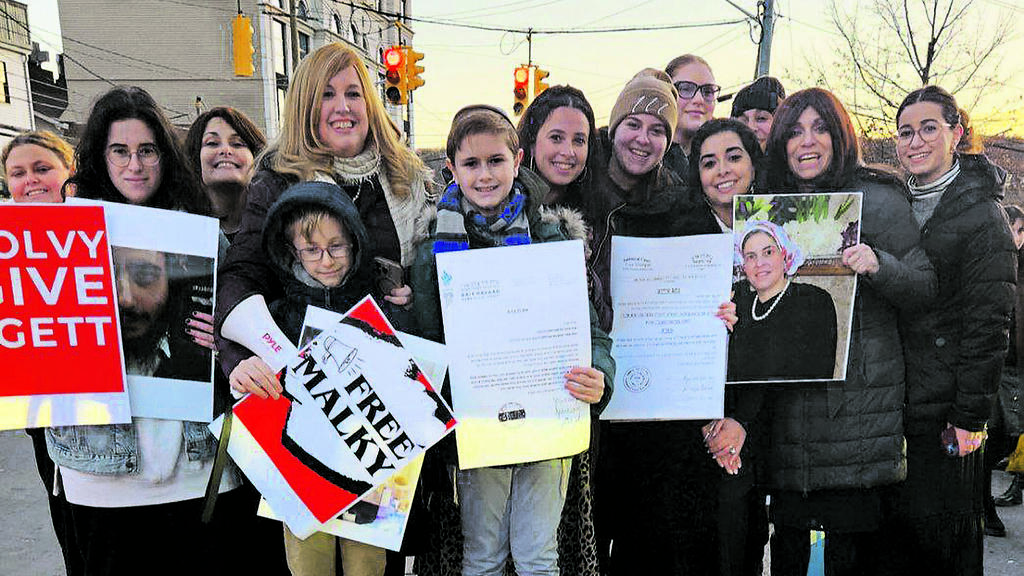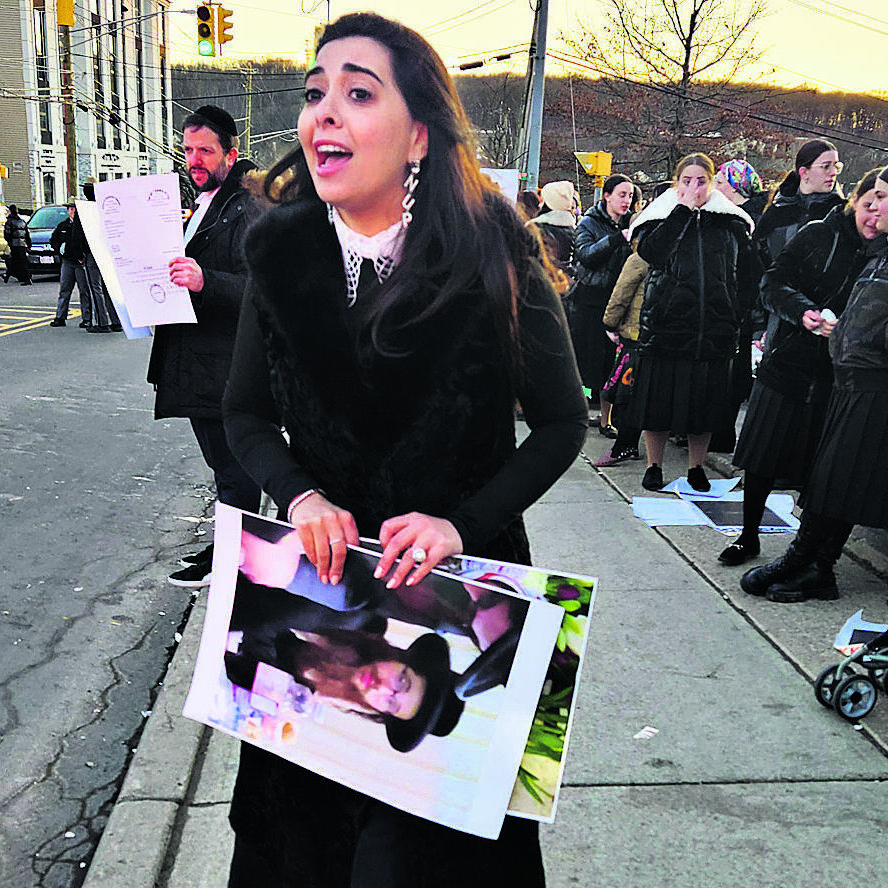Getting your Trinity Audio player ready...
Last month, Adina Sash had a conversation with one of the rabbis against whom she has been fighting for many years on behalf of Orthodox Jewish women who are "agunot," unable to obtain a religious divorce.
Sash, as will be seen, has never encountered a fight for the equal rights of Orthodox women - essentially, human rights - that she was afraid to enter.
This specific conversation with the rabbi was part of her ongoing effort to free Malky Berkowitz, a 29-year-old "agunah" whose husband has refused to grant her a divorce for four years.
“I said to the rabbi,” recounts Sash, an activist with fire in her heart and a sense of humor, ”if you don't figure out a way to pressure the husband to give Malky a divorce, I am going to bring a gay pride parade to Williamsburg.
“He asked me what’s that. He knows exactly what that is. Going to the mikveh every single morning. Ok? And they have a lot of fun in the mikveh. The men will love having fun. Ok, so first of all, don't play stupid.”
The threat proved ineffective, leading Sash and other Orthodox activists to deploy their ultimate weapon: a sex strike. For two months, hundreds of Orthodox women across communities in New York and New Jersey have been doing what was until recently unthinkable - they are saying no.
“A lot of women in the community — Satmar, Lubavitch, yeshivish, litvish, all these women — were telling me over the last few years ‘I feel like I want to make a change and I want to help agunot but when I talk to my husband or my rabbi, they don't take me seriously because I'm just a woman.’ I wish the men were more involved.”
This sex strike is an extreme move, certainly in your world.
“They say change happens with pressure. We came up with this idea that we would give women an understanding and an option of a weapon that they could use to pressure their husbands because a lot of these women think that this is prohibited.
"First of all, yes, you have to go to the mikveh to have relations with your husband. But just because your mikveh night is Tuesday night, if you don't want to go Tuesday night and you feel unsafe with your husband or you feel like your husband is not taking you seriously about agunot then push it off a day or two.
“This teaches women that their body belongs to them and the decisions they make with their body, even if they're married, even if they're keeping family purity laws, it doesn't matter. Your body belongs to you”.
How many women are taking part in this strike now?
“At least 800 as of the first week and it's just growing and growing. Each woman on her own level. The concept is to give women encouragement, that we're not going to fix the agunot crisis by being a nice girl. You have to be mad, angry, screaming, yell, fight. That's the only way that the rabbis are going to listen.”
American shtetl
Kiryas Joel is a village located about an hour's drive northwest of New York City, inhabited by nearly 40,000 members of the most stringent stream within the Orthodox Jewish community. It is one of the poorest places in the U.S., with a poverty rate four times higher than the national average, where almost all residents receive medical care through Medicaid.
Essentially, Kiryas Joel is an “American shtetl,” as dubbed in the book written by Jewish professors David Myers and Naomi Stolzenberg. They described it not as a replica of an authentic Jewish town in Eastern Europe but as a very conservative American version where religious freedom and the sanctity of private property are paramount.
Deviation from religious or cultural norms is severely punished, with numerous instances of tire slashing, car burning, window shattering and even physical assault against those who challenge rabbinical rulings.
This is where Malky Berkowitz grew up. At 22, she met Wolvie, the man arranged for her in marriage, who was three years her junior, for just ten minutes. She knew nothing about him, relying solely on what her parents and matchmakers said.
“That the boy had very serious mental health issues… and she didn't know,” says Adina Sash. “She didn't feel comfortable with the match, but she didn't really know that she has a voice to say ‘I don't want this.’
“In that community, you do what you're supposed to do, get married. You have kids and still you're not happy. Who's happy? No one's happy."
That's very dark.
"That's your job. Don't be happy if you're not happy, you're doing it well.”
When did she snap?
"Four years. She thinks every day, “God's going to save me, God's going to save me,’ but no one's listening to her.”
Did she even have anyone to turn to?
“For rabbis in the Kiryas Joel community whose approach is ‘there’s no such thing as a divorce. It's not a thing.’ It's not an option, it’s modern, goyish. The only choice is to fix the marriage.
“Rabbis tell the men ‘don't worry if you hold back for long enough. She's going to say ‘I can't live like this. I need to have a relationship, I need to move on, so I guess I'll just go back.’”
What does her husband's family say?
“The family says different things depending on the day. One day they say, ‘yes, we want him to give a get (divorce paper).’
“So we say, ‘if you want him to give a get, then can you try to pressure him a little bit? Pressure him, take away the money you give him? Take away the support. Don't pay his rent. Don't pay for his car service. Don't pay for his food. Tell him that he's going to be out of the family if he doesn't give it.
“And they say, ‘Well, that's too much. He has to want to do it with his heart.’ So that's not something they want and then the next time they say she's not letting him see the kids.
“That's a total lie. She never said, ‘you can't see the kids.’ He could come and see the kids whenever he wants, but in their minds, she has to put the kids in the car, drive to the house and say here's the kid. As if you don't give the kids on a silver platter, then you're not letting him see the kids.”
A fool's bargain
The first known mention of a sex strike is found in the ancient Greek comedy Lysistrata written by Aristophanes in 411 BCE, where the eponymous heroine calls on women to abstain from sex with their husbands until they negotiate an end to the Peloponnesian War.
Nearly 2,000 years later, in the 1930s, Nicaraguan women used this tactic to protest against the Spanish slave trade. In 2003, Leymah Gbowee from Liberia led a campaign to end her country's brutal civil war, suggesting women withhold sex from their husbands. Although the strike wasn't fully implemented, the threat alone drew global attention.
“Sex is an exotic thing, and many people would say it's a taboo subject,” Gbowee said after winning the 2011 Nobel Peace Prize. “But when someone dares to bring it to the attention of the public, it has two results. People start saying, "who's this person doing this?" and they start asking why the person is using sex to highlight an issue.
“And it gets men thinking. There are a lot of good men out there! The percentage of men who wage war is very small. Good men outnumber evil men, but why are they silent? Our strategy helps the good men because it gives them a reason to take action. They start talking to their colleagues and beer buddies, saying ‘this war is wrong.’”
In 2008, hundreds of women in Naples pledged to abstain from sex unless their men agreed to avoid setting off dangerous and illegal fireworks during New Year's celebrations. The following year, women in Kenya initiated a week-long sex strike, perhaps more aptly called a boycott, again to protest against war.
Patricia Nyaundi, a campaign leader, said at the time, "Many excellent decisions are made during pillow talk, so we're asking that at that intimate moment, women ask their husbands: 'Dear, can you do something for Kenya?'"
Last year, Hollywood actress Alyssa Milano, known primarily for Who's the Boss? and the Me Too movement, called on women in America to stop having sex with their male partners as a protest against new abortion laws across the U.S.
Not everyone believes a sex strike is an effective measure. Daphne Lazar Price, executive director of the Jewish Orthodox Feminist Alliance, told the Jewish Telegraphic Agency that women should not have to withhold sex from their husbands to get men’s attention and that using sex as a form of coercion is also highly problematic.
Psychologist Peggy Drexler, a sex and gender researcher, told the BBC that a sex strike would reinforce the idea that women engage in sex only to please men or to have babies. It takes away women's autonomy to want to have sex for sex's sake.
Adina Sash is familiar with the criticism but disagrees with it, especially in the specific context of women in the Orthodox Jewish community where she lives. According to her, it is a community where women are expected to have sex solely to please men or to have children.
“It's about finding a place in the system where if women said, ‘I'm not doing this.’ the rabbis need to get together and figure out a solution because it threatens the whole system. The whole system could collapse," she says."
Are there women who oppose the idea?
“A lot of women don't care about agunot because they don't understand that they, their sister, their mother, their daughter could become an agunah. They don't understand how the system works. We're not allowed to learn the rules that apply to us when we want to get divorced, we're not allowed to know that.”
How do the men react?
“Some men are saying, ‘why are you taking sex away from me? You're controlling my body’.
Come again.
“Yes, some think ‘I'm entitled and you're it away from me.’ When I see them, I say two things. First of all, when the rabbis take away from Malky the ability to have a relationship and sex, you're not crying. You're angry about one night or two nights or three nights a week, you're angry about one week. Malky did not have sex in four years.
“This is an innocent Satmar Hasidic lady. She thinks every day, ‘God's going save me, my Torah is going to save me,’ but no one's listening to her. If we don't save Malky now, she's going to be agunah forever. Even a woman who's very smart and knows exactly how to play the system could still be trapped for four years.”
Are the rabbis not alarmed by the strike threats?
“This went on for years and the rabbis didn’t care, and it's been the rabbi saying, ‘you can't do a sex strike, you're not making babies. You have to make babies!’ But what about Malky? Malky wants to have babies but you only care when men complain.
"What's being done to agunot is torture, but when women try to free each other using extreme means, of course, it's forbidden. If you don't give us power in the community, if you deny our dignity and rights, don't be so surprised when we take whatever power we have left. The Torah has solutions, but the leadership refuses to use them, preferring instead to leave women trapped."
What's the solution to the problem?
“To do a mekach taut (annulling marriage secured under false pretenses or with hidden information) or bitul kiddushin (annulment of marriage) that you can buoy the marriage. They don't do this anymore. They used to do marriage voiding but nowadays it's considered very controversial. No one knows how to do it.”
How many agunot are there in the Orthodox community?
“Ballpark. There are no numbers yet. I don't know of any studies, but there are hundreds in New York, hundreds in New Jersey, hundreds across the rest of the United States.
“Then you have thousands and thousands of women who gave up in order to get their gett. Custody, their house, money, their alimony. They dropped rape charges. Even women who are not technically or halachically agunot. Every Orthodox woman could become an agunah tomorrow if the husband decides.
“I know a woman who’s been waiting for her gett for 17 years. And the only way her husband will give the get is if the house that she inherited from her parents. The only way he's going to give her the get is if she gives him the house.”
That’s got to be illegal somehow.
“There's no way for the United States justice system to interfere, they can't do anything. So we're working on a website that a lot of advocates for agunot worked on together, and it's called Make It a Felony, making gett withholding like coercive control which is not legal.
“It's still not really a solution, because for a woman to go to court, she needs to get permission from the rabbis. And then you go to court and court could take years.
"The bank charges each side $250 an hour, and sometimes the husband says he'd come but doesn't want to pay any banking fees so the woman would pay them for him and he would drag it for weeks and months and years. And the woman is paying for all the sessions and the rabbis say 'you're the one who wants freedom so you're the one who should pay. And you're the one who should give up everything.'"
Anti-Judaism
Adina Sash, who was born in Brooklyn and lives there to this day, was not a normal child. “I've always been very outspoken about protecting Orthodox women and giving Orthodox women more equality,” she says.
“My mother is very strong-minded and she's very loud about it but she was never public about her opinion, only my family knew about it. She told the whole family that she was going to speak at my brother’s bar mitzvah, this goes back to 2001 or maybe 2002, and they said ‘no, you're not allowed to,’ and she said ‘don't tell me what to do. I'm going to speak at the bar mitzvah.’ And I was inspired. But I also felt frustrated that her message wasn't getting out there.”
Would you describe yourself as a feminist?
"One hundred percent yes. A very loud, angry feminist. It's funny because if you ask other Orthodox women who are clearly feminists they would say no.
They're scared of the word.
“They want equality for women, but aren’t feminists? Yeah right. But you know who else was a feminist? Queen Esther, prophetess Deborah, Sara, Rachel and Leah were all feminists, so I don't know why people are so afraid of feminism if feminism is in the Torah."
Sash has been married for 18 years and is a mother to two children, teaches at a college and volunteers with Ezrat Nashim, an organization providing emergency medical services to Orthodox women.
She maintains an active social media presence, particularly on Instagram, yet manages a completely Orthodox household. Her children attend yeshiva, she observes the Sabbath and kosher dietary laws and visits the mikveh.
What does your husband say about all this?
"He supports me. I get a lot of hate. People know my phone number and where I live. They call me to threaten me and threaten my family. They say ‘I know exactly where you live.’”
How did New York’s Orthodox community react to October 7?
"We were devastated for the first six to eight weeks of the war. We were sending whatever we could, sending as much money as we could, praying all the time, and every time we would check the news and learn about another soldier who died. We feel very alone because there's a lot of antisemitism. But some of the most extreme communities don't care about Eretz Yisrael and they happen to have the worst agunot problem.”






